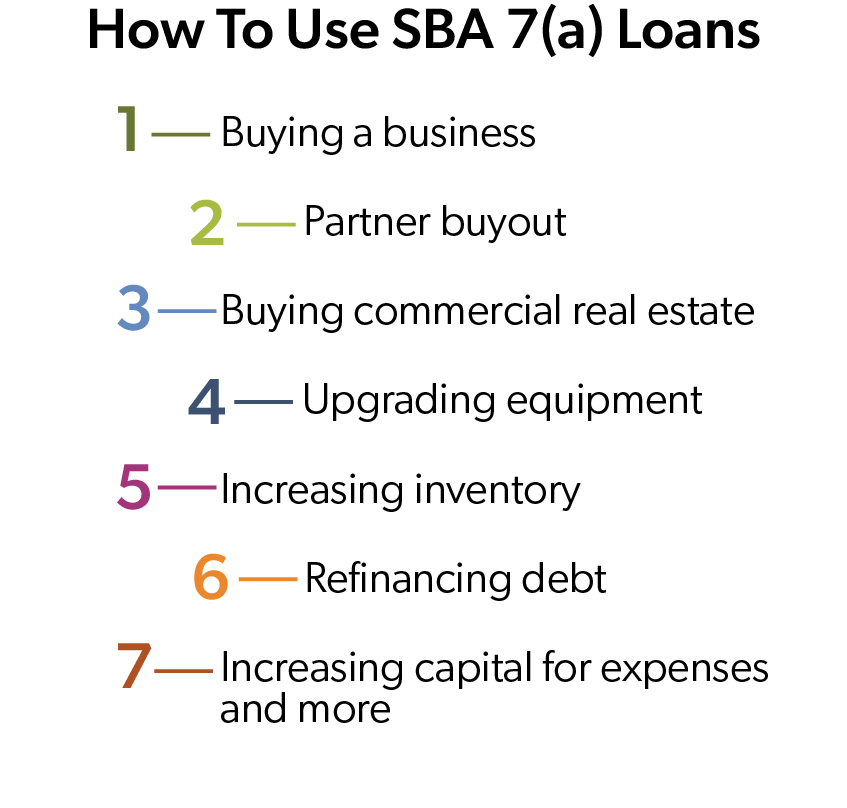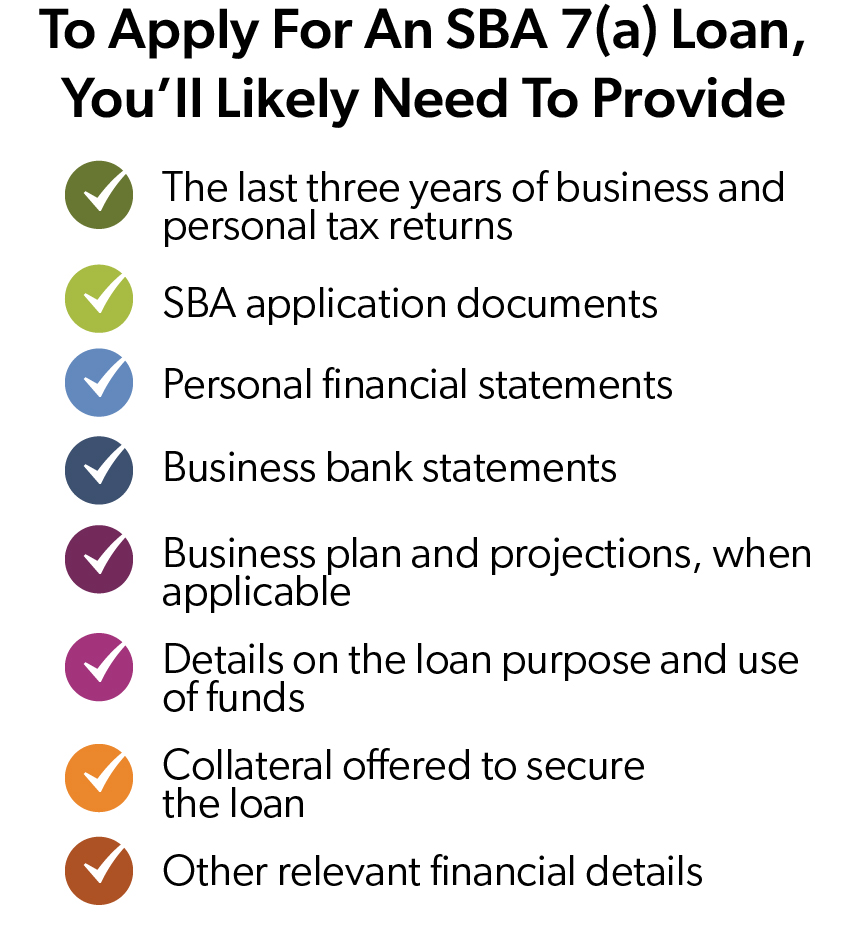The most popular SBA loan program, the SBA 7(a), helps business leaders fund their strategic plans, like buying a business, purchasing commercial real estate, buying out their partner, upgrading equipment, increasing inventory, increasing capital for expenses, refinancing debt, and much more.
But what are the essential things to know before submitting an SBA loan application, and how do you know it’s right for your business? Let’s dig into some essentials about SBA loans, like how SBA Lending works, SBA 7(a) loan requirements, benefits, & how to apply.
How Does The SBA Loan Program Work?
Through a partnership with the U.S. Small Business Administration (SBA), part of the United States federal government, banks and other lenders fund more than 50,000 SBA 7(a) loans to businesses every year. The SBA 7(a) loan program provides essential financing to help business leaders achieve their strategic short-term and long-term plans.
Many people believe the government lends money for SBA loans, but it does not. The SBA oversees the framework and rules for the SBA Lending program, while banks provide the actual funds for the loans. To get an SBA 7(a) loan, you apply through a bank that’s experienced in SBA Lending, preferably one that’s designated an SBA Preferred Lending Partner (PLP) by the SBA.
The SBA provides a guaranty on 7(a) loans, which allows banks to offer lower interest rates, very low SBA loan down payments (sometimes no down payment), and long 15- to 25-year repayment terms. If that sounds good to you, let’s move on to qualifications and what you need to apply for an SBA 7(a) loan.
SBA 7(a) Loan Requirements
The SBA 7(a) loan program is designed to help a wide variety of small businesses get funding, but not all businesses qualify. When determining a business’s SBA loan eligibility, there are some key factors the Small Business Administration considers. Some qualification requirements for an SBA loan include:
- Businesses must operate for profit
- Businesses need to be located in the U.S. or its territories
- Business owners with more than 20% of the business must provide a personal guarantee
- Borrowers must be able to document how loan proceeds will be used
Applicants also must be small under SBA size requirements (including their affiliates). The SBA uses the number of employees and annual income to guide its size requirements, which vary greatly by industry. For instance, a manufacturer of footwear can have up to 1,000 employees, but a sawmill can only have 500 employees and be called a small business. Similarly, a sheep farming operation is allowed up to $3.5 million in annual revenue and still considered small, while a company producing chicken eggs is deemed small if it’s making less than $19 million a year.
Your business also must prove the ability to repay the loan with financials and projections. Businesses in many industries qualify for SBA 7(a) loans, including retail stores, restaurants, hotels, manufacturers, contractors, professional service firms, and many more.
Businesses Ineligible For An SBA Loan
Certain types of businesses are not eligible to receive SBA loans, even if they meet the size and other requirements.
- Nonprofit organizations
- Businesses that primarily lend money, such as banks and finance companies
- Life insurance companies
- Businesses located outside the United States
- Adult entertainment industry businesses
- Businesses that conduct lobbying or other political activity
- Firms involved in illegal activities
Understanding the SBA eligibility criteria is crucial for entrepreneurs seeking loan financing. While there are some restrictions, most small businesses in the United States are eligible for SBA loan programs, which have helped millions of entrepreneurs achieve their dreams of business ownership and growth.
What Can An SBA Loan Be Used For?
There are many ways you can use an SBA 7(a) loan within your business. While a 20% to 30% down payment is usually required for conventional business loans, 7(a) loans open doors for business leaders without a lot of capital. The SBA guaranty reduces the risk for lenders while also giving business owners access to credit they might not qualify for otherwise.
 Two common uses of SBA 7(a) loans are buying a business and purchasing commercial real estate — in fact, business leaders can secure up to 100% financing on eligible real estate purchases, requiring no down payment. When buying an existing business or starting up a new one, 7(a) loans often only require a 10% down payment in many cases.
Two common uses of SBA 7(a) loans are buying a business and purchasing commercial real estate — in fact, business leaders can secure up to 100% financing on eligible real estate purchases, requiring no down payment. When buying an existing business or starting up a new one, 7(a) loans often only require a 10% down payment in many cases.
Although many banks pulled back on SBA Lending, First Business Bank provides low down payment SBA 7(a) loans that are not widely available elsewhere.
Other common uses of SBA 7(a) loans include:
- Funding business needs and startup costs like inventory, advertising, and payroll
- Buying an existing business or buying out a partner
- Refinancing high-interest business debt with unreasonable terms
- Purchasing commercial real estate like office buildings, warehouses, or retail space
- Funding tenant improvements like renovating retail space
- Buying equipment, machinery, supplies
- Covering costs with short- and long-term working capital
- Increasing inventory for growth or seasonal spikes
How to Apply For An SBA 7(a) Loan
Once you confirm your eligibility for an SBA 7(a) loan and find a reputable, experienced PLP lender who confirms they can help, the next step is gathering documents and forms to submit a complete application. Each lending institution may have its own SBA 7(a) loan requirements, but there are standard pieces of information and paperwork all prospective SBA borrowers need to provide.
 It’s to your advantage to provide an accurate, complete picture of your situation for the lender’s underwriting team so they can efficiently process and review your request. Providing the right documents avoids delays from gaps in information.
It’s to your advantage to provide an accurate, complete picture of your situation for the lender’s underwriting team so they can efficiently process and review your request. Providing the right documents avoids delays from gaps in information.
What Do I Need To Apply For An SBA 7(A) Loan?
Application requirements for an SBA loan often include:
- The last three years of business and personal tax returns
- SBA application documents
- Personal financial statements
- Business bank statements
- Business plan and projections, when applicable
- Details on the loan purpose and use of funds
- Collateral offered to secure the loan
- Other relevant financial details
An experienced SBA Lender will walk through all the required information with you to ensure that your SBA 7(a) loan application is complete. But you’ll also want to make sure you understand the usual timeline and when you can expect to hear about loan approval or next steps from the bank.
What Do Business Owners Wish They’d Known About SBA 7(a) Loans?
Sometimes first-time SBA borrowers are surprised to learn about some of the requirements of the SBA 7(a) loan program. To set accurate expectations, our SBA loan experts weighed in on what they hear most often from business owners about what they wished they’d known before getting an SBA 7(a) loan.
- The SBA Requires A Personal Guarantee And Collateral For SBA 7(a) Loans. This means owners with a 20% or greater stake in the business need to pledge personal assets as collateral and become personally responsible for repayment if the business can't pay. This guarantee extends to spouses as well unless exempted by state law. Many pledge personal real estate because the SBA requires borrowers to exhaust all possible collateral sources before securing the federally guaranteed loan.
- SBA Loan Lenders Sometimes Require A Life Insurance Policy. This often catches business owners off guard, but a life insurance policy helps to protect the lender's interests should an unforeseen tragedy occur. If the primary owner passes away unexpectedly, the life insurance coverage helps to pay off the outstanding SBA loan balance. Life insurance policy premiums are an additional recurring expense, as well.
By understanding these aspects upfront, potential borrowers can factor them into plans and expectations about securing financing via SBA 7(a) business loans. An experienced SBA lender can help you determine how the SBA 7(a) program rules apply to you and your business.
What Surprises Business Owners About SBA 7(a) Loans?
Many business owners don’t realize that small business loans open doors to business ownership that may seem financially out of reach. In fact, they often are surprised to learn they don’t need millions in cash to buy an existing business they know and love. First Business Bank’s SBA Lending experts often help business owners put 10% down and finance the rest with an SBA 7(a) loan to make their dream possible.
Small Business Loan Programs Unlock Possibilities For Business Leaders
As highlighted in this piece, the 7(a) loan program provides financing that enables business leaders to pursue goals that might otherwise seem out of reach. From buying commercial real estate with no money down to securing working capital at reasonable rates when your business doesn't quite qualify with a conventional lender, SBA 7(a) loans open doors to what’s possible.
First Business Bank's team of SBA Lending experts understands the process inside and out and guides borrowers appropriately based on individual situations. To learn if an SBA 7(a) loan could be a strategic fit to grow your business or achieve a milestone like a change of ownership, connect with one of First Business Bank's bankers to further explore options. Their insight and guidance may reveal more possibilities than you realize when mapping out financial plans to reach your most ambitious objectives.





